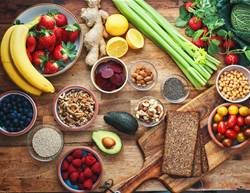If you want to improve your gut health, the list of “biotics” can be very confusing. You just get your head around prebiotics and probiotics when you start hearing about postbiotics and tribiotics… We break down what each of the “biotics” does for your health.
Why does gut health matter?
First, what’s the big deal with gut health? Well, more and more research is coming out linking gut health to chronic disease, says Theronomic founder and chairman of The Gut Foundation Australia Dr Ross Walker.
“We're comprised of around 30 to 40 trillion human cells and between 40 to 100 trillion gut bacteria,” he says. “I believe we may all have some degree of gut dysbiosis, which means our gut bacteria aren't as healthy as they should be.”
If you have gut dysbiosis, or poor gut health, you may have “bloating, excessive gas, abdominal pain, cramping, the whole thing that goes with irritable bowel syndrome,” says Dr Walker.
But gut health isn’t just linked to gut symptoms. It can impact everything from heart disease, type 2 diabetes and mood.
“All of these things are so connected, so we have to have good gut health, which really starts by what you put in your mouth,” says Dr Walker.
The good news? You can change the health of your gut through getting enough sleep and exercise, and through a good diet. Think less processed and sugary foods and more fruits and vegetables. And good gut health may lead to a better immune system, fewer chronic illnesses and even better sleep,
Diet is the best place to start for boosting your gut health, but a lot of us have a long way to go, says Dr Walker.
“We need around 30g of fibre per day to have a healthy gut. In my view all people should be having 2 to 3 pieces of fruit per day and 3 to 5 servings of vegetables per day and sadly only around 4% of the population do so,” he says.
Now, we’ll go through each of the “biotics” to break them down.
What are probiotics?
Probiotics are live beneficial organisms that can strengthen your gut microbiome, reports The Conversation.
Health benefits
Research shows that probiotics may help with our immune system, constipation, traveller’s diarrhoea, IBS and ulcerative colitis. They may also help with skin conditions, high cholesterol and gum disease. But crucially, not all probiotics are equal. There are many different kinds and each has its own uses. So, if you’re looking for a specific benefit, it’s best to speak to a dietitian or doctor for advice.
“Probiotics work so much more effectively if they have healthy food being fed into the system, for example, prebiotics,” says Dr Walker.
Best probiotic food sources
Healthy Food Guide recommends you boost your prebiotic intake by eating more:
✓ Yoghurt*
✓ Kombucha*
✓ Sauerkraut*
✓ Miso*
✓ Kefir*
✓ Muesli**
✓ Peanut butter**
*Probiotics may be naturally occurring or added
**Probiotics are added to this food product
What are prebiotics?
Prebiotics are food substances that can strengthen your intestinal barrier and enhance your immune responses. The majority of prebiotics are essentially carbohydrates we can’t digest, such as fibre. These healthy carbs are like fertiliser for friendly gut bacteria, reports Prevention US.
Best prebiotic food sources
The best way to load up on prebiotics is by eating fibre-rich plant foods, especially bananas, asparagus, whole grains, onions, garlic and soybeans, reports The Mayo Clinic. The more diversity in plant foods you get, the better. Think everything from beans and quinoa through to apples and asparagus.
Healthy Food Guide recommends you boost your prebiotic intake by eating more:
✓ Couscous
✓ Black beans
✓ Brussels sprouts
✓ Leeks
✓ Garlic
✓ Butternut pumpkin
✓ Beetroot
✓ Rolled oats
✓ Prebiotic-enriched breakfast cereals & muesli
✓ Prebiotic-enriched bread
✓ Prebiotic-enriched milk
What are postbiotics?
Even if you know a thing or two about prebiotics and probiotics, many people get confused by the time we mention postbiotics. In fact, 86% of us don’t know what they are, according to a Theronomic survey. Even scientists are still working out how they work.
“Postbiotics are the healthy chemicals created by healthy bacteria,” says Dr Walker.
Your body produces postbiotics “after digesting prebiotic and probiotic foods”, reports The Conversation.
Health benefits
Postbiotics are important for your gut health and some of them can help suppress bad bacteria in your body.
Postbiotics show promise for calming intestinal inflammation, easing constipation, managing allergies, boosting immune health and more, reports Prevention US. Various studies have shown that probiotics may help prevent some types of cancer.
Best postbiotic food sources
Getting fibre from fruit and vegetables is a great way to increase postbiotics in your gut. Additionally fermented foods can also be beneficial. Studies show you can boost your probiotics by eating more:
✓ Cottage cheese
✓ Oats and flaxseeds
✓ Pickles and pickled vegetables
✓ Kefir
✓ Kimchi
✓ Kombucha
✓ Miso soup
✓ Sauerkraut
✓ Yoghurt
✓ Sourdough bread
What are tribiotics?
Tribiotics are supplements that contain probiotics, prebiotics and postbiotics in one handy package.
“Prebiotics are the high-quality nutrients used by healthy bacteria, probiotics are the healthy bacteria themselves, postbiotics are the healthy natural chemicals secreted by healthy bacteria and are vitally important in maintaining a normal healthy metabolism,” says Dr Walker.
“Enhancing these chemicals with postbiotics makes a tribiotic more effective than using probiotics alone,” says Dr Walker.
While a varied plant-based diet is recommended as the best fuel for our gut, the reality is that our busy lives can make it challenging to get the mix right, which is where a tribiotic may be helpful to address any imbalance in the gut.
After all, a healthy gut is a key foundation for overall wellness, influencing not only digestion but also immunity, mood, and long-term health.
At Prevention, we only collaborate with trusted brands. To bring you this article we have partnered with Theronomic.










